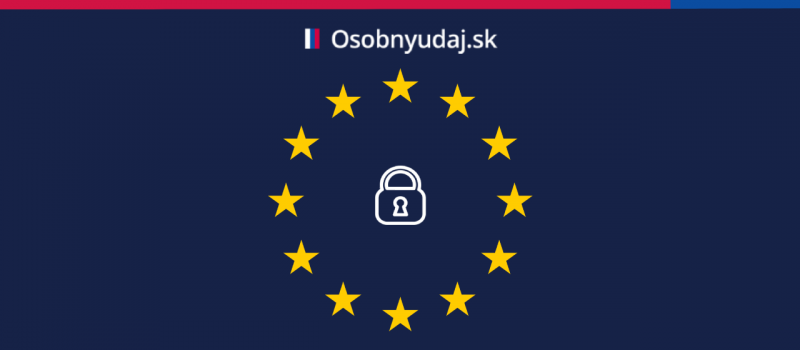New Act as of May

New Act as of May
GDPR (General Data Protecion Regulation) is a general data protection regulation. It is a set of comprehensive data protection rules within the European Union. Already on May 25, 2018, the GDPR will replace the current Personal Data Protection Act in Slovakia.
New Act no. 18/2018 Coll. on the protection of personal data and on amendments to certain acts
- The approved version of the new Personal Data Protection Act and on amendments to certain acts was published in the Collection of Laws of the Slovak Republic.
- This Act aligns the Slovak legal order with the new GDPR.
- This Act will replace the current Personal Data Protection Act no. 122/2013 Coll.
- The reason for amending the law and amending some acts is to bring the national legislation on the protection of personal data into line with the Regulation of the European Parliament and the EU Council.
- GDPR creates a new modernized legal framework for the protection of personal data, which aims to ensure respect for fundamental rights and freedoms, in particular the right to the protection of personal data.
The purpose of the new Act is to harmonize the legal regulation of the processing of personal data of natural persons in the legal order in Slovakia. This Regulation also aims to regulate the new institutes, the procedural rules and the status of the data protection supervisory authority. The Regulation also reflects the experience of the Authority and its application practice in order to make this adjustment operational and effective. Part of the harmonization is also the amendment of special laws regulating the processing of personal data of natural persons.
New Privacy Policy according to GDPR:
- the principle of legality,
- the principle of justice,
- the principle of transparency,
- the principle of data minimization,
- the principle of correctness,
- the principle of minimizing retention,
- the principle of integrity and confidentiality,
- the principle of responsibility.
The Slovak legislation on the protection of personal data is considered one of the strictest in the EU countries. Nevertheless, it will be necessary to analyze the method of processing personal data for entities that have been and are processing personal data in accordance with the Personal Data Protection Act 18/2018 Coll. It will also be necessary to adopt internal documents and reported information systems, brokering services, etc., and to incorporate the changes that the new GDPR will bring.
If you are interested in ensuring your privacy policy in line with GDPR, please request a free quote.
Vyhľadávanie
Most read articles
Categories
Recently added articles
Popular tags
Contact form
Preparation of Security Documentation in terms of GDPR from 139€ with insurance.
- Infoline:
- E-mail:
osobnyudaj.sk, s.r.o. Námestie osloboditeľov 3/A,
040 01 Košice
Non-binding free quote
from € 139 with insurance
We have provided services
to more than
11 500 clients
Questions and answers
Dear client, if you have not found
what you are looking for, do not hesitate
to contact us.
-
What is GDPR?
-
General Data Protection Regulation (GDPR) is the acronym for Regulation…
Find out more
-
-
Who is affected by the GDPR?
-
It applies to all persons processing personal data and any…
Find out more
-
-
What changes come with the GDPR?
-
The fundamental changes of the GDPR include: compulsory appointment of…
Find out more
-
-
Who is Data Protection Officer (DPO)?
-
All organizations processing personal data must count on the appointment…
Find out more
-
-
What happens if I do not comply with GDPR?
-
In the event of a breach of the GDPR regulation,…
Find out more
-
-
How can we help you?
-
Osobnyudaj.sk, s.r.o. is the largest provider of personal data protection…
Find out more
-
-
What are advantages of working with our company?
-
personal visits throughout the Slovak Republic are a matter of…
Find out more
-
-
What is personal data?
-
For the purposes of the GDPR, all information relating to…
Find out more
-
-
Who is Data Protection Officer?
-
All organizations processing personal data must count on the appointment…
Find out more
-




